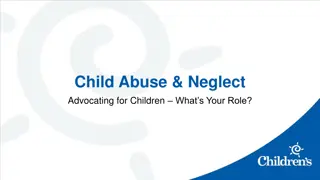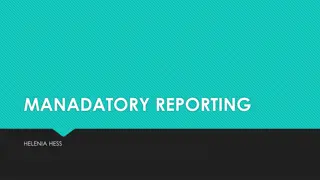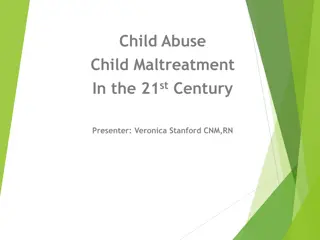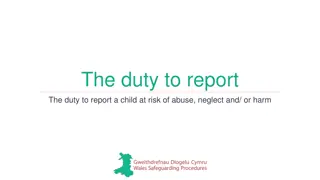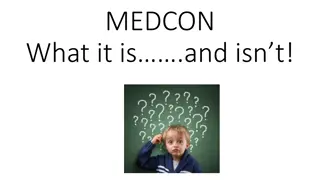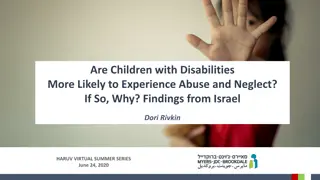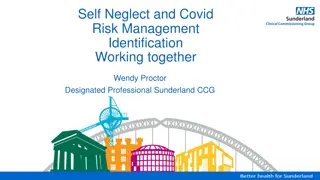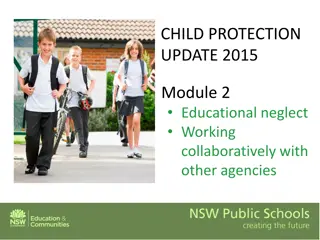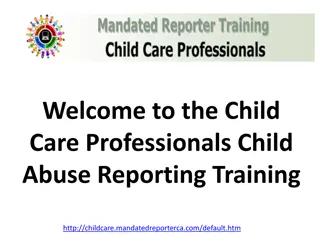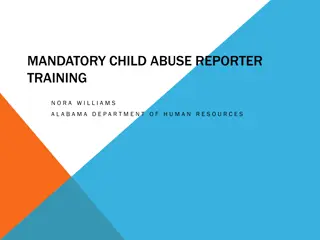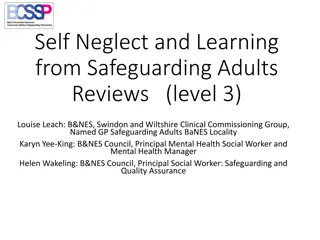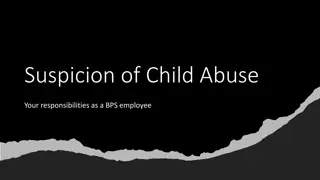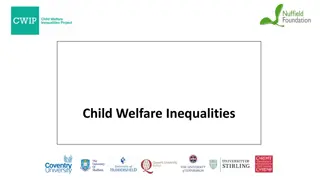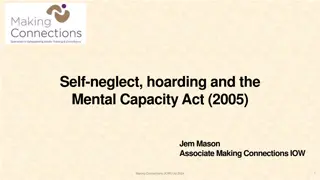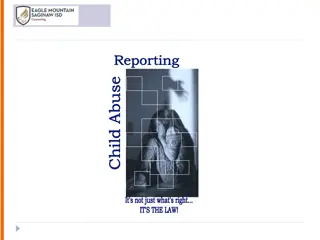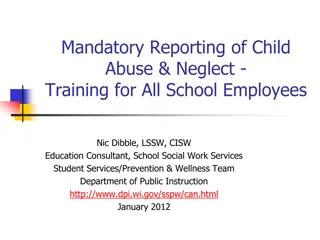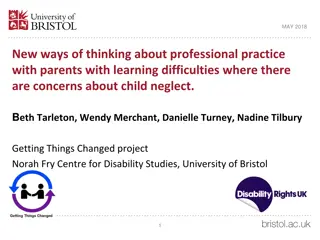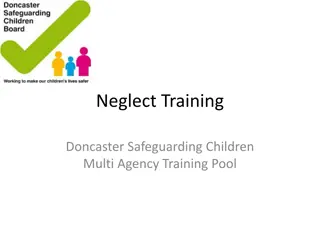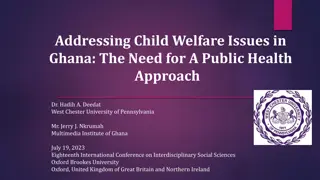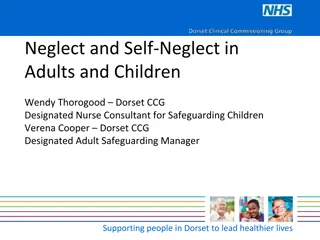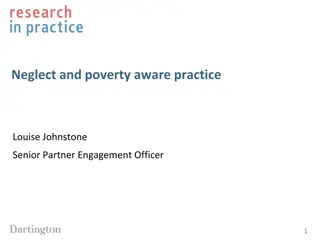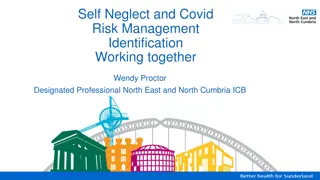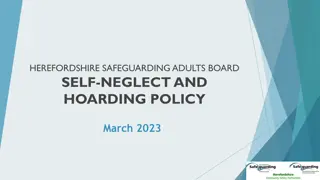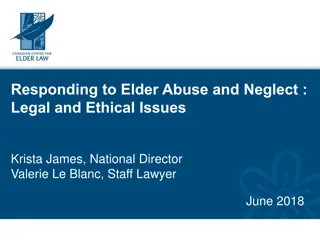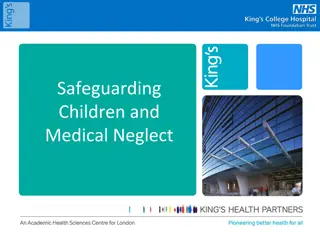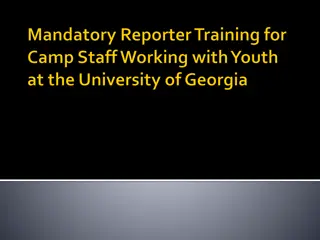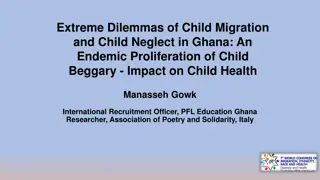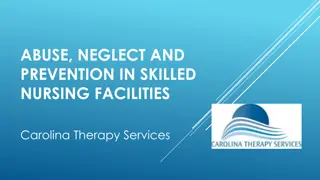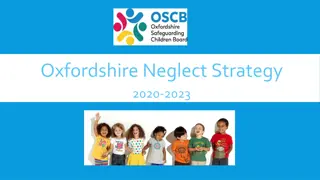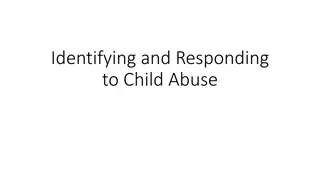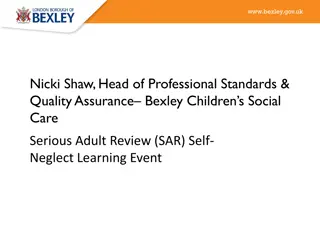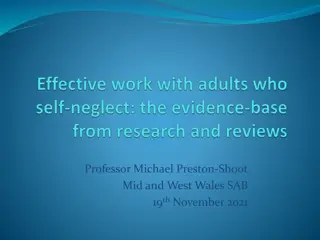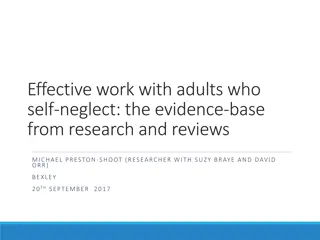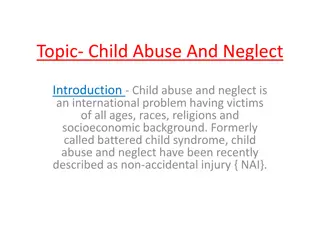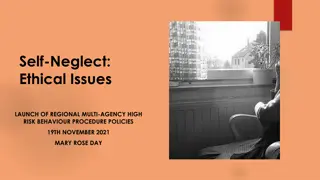Educational Neglect
Explore the concept of educational neglect, responsibilities for ensuring a suitable education, and the United Nations Convention on the Rights of the Child pertaining to education. Topics include school attendance, children missing education, home education, and the role of various parties like loc
0 views • 13 slides
Advocating Against Child Abuse and Neglect: Your Essential Role
Understanding the importance of advocating for children facing abuse and neglect is crucial for all individuals, regardless of their position. Learning about child abuse, recognizing signs, mandatory reporting laws, and knowing how to take action are essential components discussed in this informativ
0 views • 22 slides
Mandatory Reporting Guidelines for Suspected Child Abuse/Neglect
Understanding mandatory reporting requirements for child abuse and neglect is crucial for various professionals and individuals working with children. This content emphasizes the legal obligations and procedures involved in reporting suspected cases, ensuring immunity for those reporting in good fai
1 views • 6 slides
Understanding Child Abuse and Neglect in the 21st Century
Child abuse and neglect are serious issues affecting millions of children worldwide. This course by presenter Veronica Stanford sheds light on identifying, reporting, and preventing various forms of maltreatment, including physical abuse, sexual exploitation, and neglect. The content delves into the
1 views • 30 slides
Understanding the Duty to Report Child Abuse and Neglect
The duty to report concerns of child abuse, neglect, and harm is essential for practitioners and individuals coming into contact with children. This responsibility, whether statutory or non-statutory, requires prompt action to safeguard children at risk. Recognizing and acting on suspicions of abuse
0 views • 20 slides
Child Abuse Medical Consultation and Training Network (MedCon) Guidelines
The Child Abuse Medical Consultation and Training Network (MedCon) provides virtual consultation for cases involving child abuse or neglect. Hospitalized patients may not always require a MedCon, as they are usually seen by local child abuse medical providers. Different scenarios illustrate when to
1 views • 25 slides
Children with Disabilities: Vulnerability to Abuse and Neglect
Children with disabilities are at a significantly higher risk of experiencing abuse and neglect compared to their non-disabled peers. Incidents such as criminal neglect, sexual abuse, and maltreatment have been reported, highlighting the urgent need for prevention programs and tailored interventions
0 views • 18 slides
Understanding Self-Neglect in Adults: Risk Management and Complex Factors
Self-neglect involves neglecting personal care and surroundings, posing risks to health and well-being. Legislation and guidance provide frameworks to address self-neglect, which can manifest in various forms such as lack of self-care and refusal of services. Professionals must consider the complex
0 views • 23 slides
Understanding Educational Neglect and Collaborative Interventions in Child Protection
Attending school regularly is crucial for children's development. Educational neglect, such as constant lateness or irregular attendance, can have serious repercussions. Schools and other agencies must work together to address and prevent educational neglect through early identification, communicati
1 views • 19 slides
Child Abuse Reporting Training for Child Care Professionals
Child Care Professionals are mandated reporters of child abuse and neglect. This training covers types of abuse, when to report, how to report, and the legal responsibilities involved in reporting suspected abuse. Failure to report can result in criminal consequences. Safeguards are in place to prot
0 views • 57 slides
Mandatory Child Abuse Reporter Training Guidelines
Understand the legal definitions and reporting requirements for child abuse and neglect in Alabama. Learn about different forms of child abuse, including physical, sexual, and neglect. Recognize the signs of abuse and the responsibilities of mandatory reporters. Discover the types of professionals r
2 views • 17 slides
Understanding Self-Neglect and Safeguarding in Adults
Self-neglect in adults involves a lack of self-care, neglect of personal hygiene, health, and domestic environment, as well as refusal of services. It can stem from physical or mental health issues, past trauma, hoarding as a coping mechanism,and low self-esteem. Learning about policies, Mental Capa
7 views • 39 slides
Child Care Challenges in Kentucky: The Child Care Cliff
Explore the landscape of child care in Kentucky, revealing the challenges families face with the Child Care Cliff. Discover statistics on child care centers, family child care homes, and the average cost of child care in Kentucky. Understand the importance of the Child Care Assistance Program (CCAP)
0 views • 18 slides
Comprehensive Overview of IMNCI - Integrated Approach to Child Health
IMNCI is an integrated approach to child health focusing on common causes of child mortality like diarrhea, pneumonia, measles, malaria, and malnutrition. Developed to address child health in developing countries, IMNCI aims to reduce under-five mortality rates through preventive and curative measur
0 views • 25 slides
PARENTS ARE OUR PASSION: TWO PROGRAMS AND THEIR IMPACT
A community service initiative at The University of Alabama, Child Development Resources (CDR) focuses on providing resources for parents and child care providers. Established in 1993, CDR offers child care resource and referral services, manages child care subsidy programs, and provides quality enh
1 views • 37 slides
Reporting Child Abuse Responsibilities in Florida Schools
Mandatory reporting of child abuse, abandonment, and neglect is a critical responsibility for all employees in Florida schools. This duty requires immediate action by anyone who knows or suspects that a child may be experiencing abuse or neglect. Failure to report such suspicions can have serious co
0 views • 8 slides
Rethinking Stories in Child Welfare: Promoting Evidence-Based Narratives
The narrative surrounding child welfare often portrays parents as victims of societal factors, neglecting individual agency and responsibility. Two contrasting stories emerge in the discourse: one focusing on blaming poverty for child abuse, and another emphasizing the role of parental actions in ne
0 views • 23 slides
Understanding Self-Neglect, Hoarding, and the Mental Capacity Act (2005)
Self-neglect and hoarding are complex issues often intertwined with mental capacity challenges. The Mental Capacity Act (2005) outlines capacity assessments, decision-making criteria, and challenges faced by professionals in safeguarding individuals. Recognizing the need for trauma-informed care in
1 views • 16 slides
Recognizing and Reporting Child Abuse: What You Need to Know
Understanding the signs of child abuse and neglect is crucial for protecting children. Learn about the laws requiring reporting, the different types of abuse, warning signs, and what you can do to help prevent child maltreatment. Remember, reporting suspicions of abuse is not just a moral duty but a
1 views • 27 slides
Mandatory Reporting of Child Abuse and Neglect in Schools: Training Overview
This training overview provides crucial information on recognizing and reporting child abuse and neglect in a school setting. Topics covered include the definition of neglect, identifying caregivers, warning signs, and reporting protocols. By watching this webcast, school employees can fulfill the l
2 views • 46 slides
Tragic Cases of Child Abuse and Neglect in the UK
The cases of Victoria Climbié, Child BR, Child C, and Child H shed light on the devastating effects of child abuse and neglect in the UK. Victoria suffered 128 injuries before her death due to abuse and neglect. Child BR's death was a result of complications from a chronic health condition, highlig
0 views • 11 slides
New Perspectives on Professional Practice with Parents with Learning Difficulties Concerning Child Neglect
Exploring innovative approaches in working with parents with learning difficulties facing concerns of child neglect, this study sheds light on the challenges, support systems in place, concerns regarding child welfare, and relationships with social workers. The research highlights the need for tailo
0 views • 47 slides
Safeguarding Children Training on Neglect and Abuse
Explore the critical aspects of neglect in safeguarding children, including defining neglect, its impact on childhood development, identifying types of neglect, lessons from serious case reviews, and assessment and intervention strategies. Engage in discussions, establish ground rules, and understan
1 views • 74 slides
Addressing Child Welfare Issues in Ghana: A Public Health Approach
Child abuse and neglect are prevalent in Ghana, necessitating a shift towards a primary prevention approach in child protection practices. Researchers aim to investigate the utilization of such methods and establish strategies for addressing child maltreatment effectively. The study emphasizes the n
0 views • 22 slides
Addressing Neglect and Self-Neglect in a Complex Family Setting
In a poignant tale of neglect and self-neglect, a family comprising a bed-bound grandmother, a daughter with learning disabilities, and a history of abuse navigates challenging dynamics. With the intervention of healthcare professionals and a fresh perspective, issues of hoarding, sexualized behavio
1 views • 14 slides
Understanding Neglect and Poverty in Practice
Explore the multi-dimensional concept of neglect, its impact on children's wellbeing, difficulties in assessment, importance of understanding individual stories, and available resources for support in addressing neglect within poverty contexts. Reflect on the crucial role professionals play in recog
1 views • 19 slides
Understanding Self-Neglect and Covid Risk Management in Safeguarding
Self-neglect is a complex issue that involves neglecting personal care and environment, posing health risks. Legislation and guidance, lack of standard definition, and factors contributing to self-neglect are explored, emphasizing the importance of a comprehensive understanding in safeguarding vulne
0 views • 23 slides
Herefordshire Safeguarding Adults Board Self-Neglect and Hoarding Policy Overview
The policy addresses self-neglect and hoarding behaviors, emphasizing the broad spectrum it covers, including lack of self-care and failure to seek assistance for critical needs. It highlights the complexity faced by practitioners in balancing autonomy and duty of care. The background data reflects
1 views • 15 slides
Understanding and Addressing Elder Abuse and Neglect: Legal and Ethical Perspectives
Explore legal and ethical considerations related to elder abuse and neglect in Canada, presented by Krista James and Valerie Le Blanc from the Canadian Centre for Elder Law. Discover definitions, laws, and resources to combat mistreatment of older adults, including insights on various types of abuse
0 views • 51 slides
Understanding Child Neglect and Medical Neglect: A Comprehensive Overview
Child neglect, including medical neglect, is a serious form of child abuse that involves failing to meet a child's basic needs, such as proper healthcare. This article delves into the definitions, examples, and scenarios of neglect, shedding light on the devastating impact it can have on children's
0 views • 17 slides
Recognizing and Reporting Child Abuse in Georgia: A Guide for Mandated Reporters
Designed to help Georgia mandated reporters identify signs of child abuse and neglect, understand legal obligations for reporting, and know how to make a report. Mandated reporters play a critical role in safeguarding children's well-being by reporting suspicions of abuse and neglect to the proper a
0 views • 41 slides
The Plight of Child Beggars in Ghana: Addressing Migration and Neglect
Child migration and neglect leading to a proliferation of child beggary in Ghana is a critical issue impacting the health and wellbeing of young migrants. This presentation highlights the background, triggers, dystopia faced by migrant children, health cases, and findings related to child beggary in
0 views • 17 slides
Preventing Abuse and Neglect in Skilled Nursing Facilities
Carolina Therapy Services emphasizes the prevention of abuse, neglect, and mistreatment in skilled nursing facilities. They provide medically related services to prioritize the physical, mental, and psychosocial well-being of residents while upholding their dignity and respect. The organization stri
0 views • 25 slides
Oxfordshire Neglect Strategy 2020-2023 Summary
The Oxfordshire Neglect Strategy 2020-2023 aims to reduce the impact of neglect on children's well-being by identifying it early within families. The strategy emphasizes understanding the child's experience, supporting families for change, and intervening early to prevent long-term damage. Feedback
0 views • 7 slides
Understanding and Responding to Child Abuse: International Perspectives and Recommendations
Within the international context, child protection is a fundamental concern guided by principles such as the UNCRC and the European Commission's Ten Principles. The EU has also enacted directives to combat various forms of child abuse, including sexual exploitation and trafficking. In England, child
0 views • 10 slides
Bexley Children's Social Care Review Findings and Recommendations
Head of Professional Standards & Quality Assurance at Bexley Children's Social Care, Nicki Shaw, shared important findings and recommendations from serious adult reviews and self-neglect learning events. The focus areas include working with fathers, multi-agency practices in child protection, improv
0 views • 5 slides
Understanding Adult Self-Neglect: Evidence-Based Practices and National Analysis
The evidence base for working with adults who self-neglect reveals key insights from safeguarding adult reviews, emphasizing the prevalence of self-neglect as a form of abuse or neglect. Case reviews highlight system failures and areas for improvement, such as legal literacy and coordination shortco
0 views • 26 slides
Understanding Self-Neglect in Adults: Challenges and Research Insights
This content delves into the complex issue of self-neglect in adults, covering its definition, key challenges, and the research evidence available. It explores the various aspects of self-neglect, including neglect of self-care, domestic environment, and refusal of services. The challenges associate
0 views • 39 slides
Understanding Child Abuse and Neglect: Types, Signs, and Impact
Child abuse and neglect are global issues affecting individuals of all backgrounds. It encompasses various forms such as physical abuse, sexual abuse, neglect, and emotional abuse. Recognizing the signs of abuse is crucial to protect children and provide appropriate intervention. It is essential to
0 views • 31 slides
Understanding Self-Neglect: Ethical Issues and Assessment Tools
Exploring the complexities of self-neglect, this content delves into associated factors, ethical considerations, assessment tools, and measurement techniques. From environmental influences to personal health behaviors, the discussion covers a range of aspects related to self-neglect in vulnerable po
0 views • 13 slides

